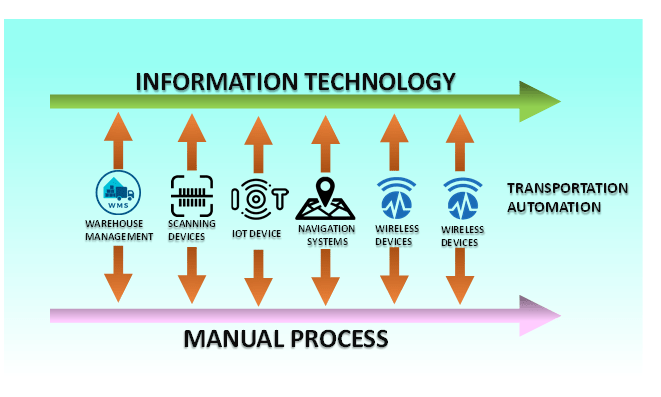Introduction
The transportation industry has always been a critical component of global commerce and societal progress. In recent years, technological advancements have revolutionized various sectors, and the transportation industry is no exception. Industrial automation solutions have emerged as a driving force behind this revolution, offering unparalleled efficiency, reliability, and safety. In this article, we will explore how industrial automation is transforming the transportation industry and shaping its future.
The Rise of Industrial Automation in Transportation
Industrial automation has significantly impacted various aspects of the transportation industry, ranging from manufacturing and logistics to maintenance and safety. Automation technologies, such as robotics, artificial intelligence (AI), Internet of Things (IoT), and advanced control systems, have enabled significant improvements in efficiency, cost-effectiveness, and overall performance.
Streamlining Manufacturing Processes
One of the key areas where industrial automation has made a significant impact is in manufacturing processes. By automating assembly lines, transportation equipment manufacturers can achieve higher production rates, improved quality control, and reduced downtime. Robots and AI-powered systems can perform repetitive tasks with precision and consistency, eliminating human errors and increasing productivity. This has resulted in shorter production cycles, faster delivery times, and ultimately, increased customer satisfaction.
Enhancing Logistics and Supply Chain Management
Efficient logistics and supply chain management are crucial for the transportation industry. Industrial automation solutions have revolutionized these areas by introducing advanced tracking and monitoring systems. IoT-enabled sensors and GPS technology provide real-time visibility of shipments, allowing for better planning, route optimization, and proactive issue resolution. With automation, inventory management has also become more streamlined, reducing wastage and ensuring optimal stock levels. Furthermore, automated data analysis and predictive analytics enable businesses to make informed decisions and adapt to changing market demands swiftly.
Improving Vehicle Maintenance and Safety
Industrial automation has played a pivotal role in improving vehicle maintenance and safety standards. Advanced diagnostics and predictive maintenance systems enable proactive identification of potential faults and prompt repairs, minimizing downtime and reducing the risk of accidents. Additionally, automation technologies are employed in driver assistance systems, such as adaptive cruise control, lane departure warning, and collision avoidance systems, making transportation safer for both drivers and passengers. Real-time data analysis and monitoring further enhance safety by detecting anomalies and alerting operators to potential risks.
Transforming Urban Mobility
Urban transportation systems are facing increasing challenges due to growing populations and traffic congestion. Industrial automation solutions offer innovative solutions to address these issues. Intelligent traffic management systems leverage real-time data and AI algorithms to optimize traffic flow, reduce congestion, and enhance road safety. Automated public transportation systems, including autonomous buses and trains, are being developed to provide efficient, reliable, and eco-friendly mobility options. These advancements not only alleviate traffic congestion but also contribute to reduced emissions and a more sustainable urban environment.
The Future of Transportation with Industrial Automation
As technology continues to advance, the transportation industry is poised for further transformation through industrial automation. Autonomous vehicles, drone delivery, and smart infrastructure are among the key trends that will shape the future. Self-driving cars and trucks have the potential to revolutionize transportation by improving safety, reducing traffic congestion, and optimizing fuel consumption. Unmanned aerial vehicles (UAVs) equipped with industrial automation capabilities can offer faster and more flexible delivery options, particularly for last-mile logistics. Intelligent infrastructure, such as connected roadways and smart traffic lights, will enable seamless communication between vehicles and the transportation network, enhancing efficiency and safety.

Conclusion
Industrial automation solutions have unleashed a new era of efficiency, safety, and performance in the transportation industry. From streamlining manufacturing processes and enhancing logistics to improving vehicle maintenance and transforming urban mobility, automation technologies are revolutionizing every facet of transportation. With the continued advancement of technologies such as autonomous vehicles, drones, and smart infrastructure, the future of transportation holds immense potential. Parijat Controlware. Inc, with its comprehensive range of industrial automation services and expertise, is poised to be your trusted partner in driving the future of transportation through innovative and sustainable automation solutions. Embrace the power of automation and unlock new possibilities in the transportation industry.
Parijat Controlware. Inc is at the forefront of transforming the transportation industry. With our expertise in robotics, AI, and control systems, we offer a wide range of services tailored to meet the unique needs of transportation businesses. Our services include manufacturing automation, logistics automation, vehicle maintenance automation, and urban mobility automation. From designing and implementing automated



